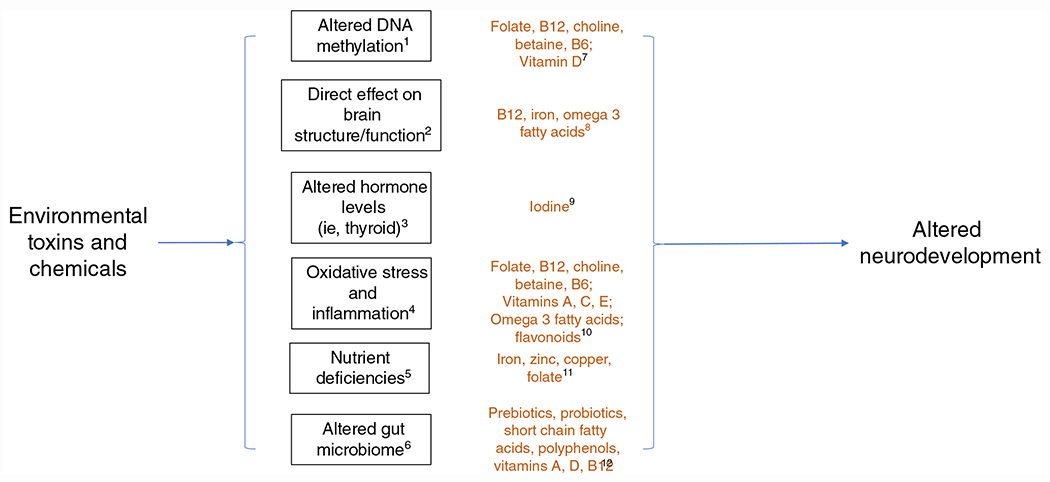The originally published version of this article contained an error in reference numbering which the authors would like to correct. In Fig. 1 (“Key pathways that may link environmental exposures, nutrients, and neurodevelopmental outcomes”), the superscript numbers do not match corresponding citations in the reference list. Originally, these superscript numbers corresponded to footnotes which contained one or more references. For interested readers, the authors have compiled a reference list specific to Fig. 1. Where applicable, they have noted the corresponding number in the main manuscript reference list. The correct Figure 1 is shown on the next page.
Fig. 1.

Key pathways that may link environmental exposures, nutrients, and neurodevelopmental outcomes
The authors apologize for the inconvenience.
| Figure 1 footnote number | Reference | Manuscript body reference number, where available |
|---|---|---|
| 1 | Keil KP, Lein PJ. DNA methylation: a mechanism linking environmental chemical exposures to risk of autism spectrum disorders? Environ Epigenet. 2016;2:1–15. | 19 |
|
| ||
| 2 | Karri V, Schuhmacher M, Kumar V. Heavy metals (Pb, Cd, As and MeHg) as risk factors for cognitive dysfunction: A general review of metal mixture mechanism in brain. Environ Toxicol Pharmacol. 2016;48:203–213 | |
| 3 | Ghassabian A and Trasande L. Disruption in thyroid signaling pathway: a mechanism for the effect of endocrine-disrupting chemicals on child neurodevelopment. Front Endocrinol. 2018;9. | 18 |
|
| ||
| 4 | Wei H, Feng Y, Liang F, et al. Role of oxidative stress and DNA hydroxymethylation in the neurotoxicity of fine particulate matter. Toxicology. 2017;380:94–103. | 17 |
| 5 | Nuttall JR. The plausibility of maternal toxicant exposure and nutritional status as contributing factors to the risk of autism spectrum disorders. Nutr Neurosci. 2017;20:209–18. | 69 |
|
| ||
| 6 | Lombardi VC, De Meirleir KL, Subramanian K, et al. Nutritional modulation of the intestinal microbiota; future opportunities for the prevention and treatment of neuroimmune and neuroinflammatory disease. J Nutr Biochem. 2018;61:1–16. | 67 |
| 7 | Dolinoy DC, Huang D, Jirtle RL. Maternal nutrient supplementation counteracts bisphenol A-induced DNA hypomethylation in early development. Proc Natl Acad Sci U S A. 2007;104:13056–61. | 41 |
| 7 | Xue J, Schoenrock SA, Valdar W, Tarantino LM, Ideraabdullah FY. Maternal vitamin D depletion alters DNA methylation at imprinted loci in multiple generations. Clin Epigenetics. 2016;8:107. | 53 |
| 8 | Prado EL, Dewey KG. Nutrition and brain development in early life. Nutr Rev. 2014;72:267–284 | |
| 9 | Chung HR. Iodine and thyroid function. Ann Pediatr Endocrinol Metab. 2014;19(1):8–12 | |
|
| ||
| 10 | Wang T, Zhang T, Sun L, et al. Gestational B-vitamin supplementation alleviates PM2.5-induced autism-like behavior and hippocampal neurodevelopmental impairment in mice offspring. Ecotoxicol Environ Saf. 2019;185. | 43 |
| 10 | Wang R, Sun DG, Song G, et al. Choline, not folate, can attenuate the teratogenic effects ofdibutyl phthalate (DBP) during early chick embryo development. Environ Sci Pollut Res. 2019;26:29763–79. | 64 |
| 10 | Tang J, Yuan Y, Wei C, et al. Neurobehavioral changes induced by di(2-ethylhexyl) phthalate and the protective effects of vitamin E in Kunming mice. Toxicol Res. 2015;4:1006–15. | 66 |
| 10 | Barthelemy J, Sanchez K, Miller MR, Khreis H. New opportunities to mitigate the burden of disease caused by traffic related air pollution: antioxidant-rich diets and supplements. Int J Environ Res Public Health. 2020;17. | 22 |
| 10 | Kajarabille N, Hurtado JA, Pena-Quintana L, et al. Omega-3 LCPUFA supplement: a nutritional strategy to prevent maternal and neonatal oxidative stress. Matern Child Nutr. 2017;13. | 51 |
|
| ||
| 10 | Spencer JP. Flavonoids and brain health: multiple effects underpinned by common mechanisms. Genes Nutr. 2009;4:243–50. | 68 |
| 11 | Nuttall JR. The plausibility of maternal toxicant exposure and nutritional status as contributing factors to the risk of autism spectrum disorders. Nutr Neurosci. 2017;20:209–18. | 69 |
| 12 | Lombardi VC, De Meirleir KL, Subramanian K, et al. Nutritional modulation of the intestinal microbiota; future opportunities for the prevention and treatment of neuroimmune and neuroinflammatory disease. J Nutr Biochem. 2018;61:1–16. | 67 |
Footnotes
The original article can be found online at https://doi.org/10.1007/s40572-022-00347-7.


